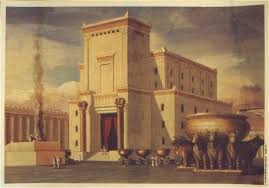In the Bible, Jachin was one of the two bronze pillars that stood at the entrance of Solomon’s Temple in Jerusalem. Jachin is an incredibly minor character. There were three men with this name in the Old Testament, and I am unsure which one we would discuss here. It seems as if the most prominent one was a son of Simeon. However, interestingly, This name means “he will establish.”The other pillar was named Boaz. Boaz is a much more familiar person. He was the man who married Ruth and served as her kinsmen redeemer. By the law, he was required to help relatives who were in trouble. Ruth was obviously in that predicament after her husband died because of the societal role of women in Israel.
This makes sense because God is the ultimate kinsmen redeemer. He sacrificed His own Son for the sake of helping humanity who was in trouble.
It makes sense that both of these would be names of the pillars on the Temple. Both of them tell us something about God and how He relates to humanity. According to 1 Kings 7:15-22 (KJV), these pillars were made by the skilled craftsman Hiram and were full of symbolic significance. The pillar Jachin represented strength and stability, while the pillar Boaz represented endurance and support.

Jachin and Boaz were not just ordinary pillars, but they were also meant to serve as reminders to the people of Israel of the importance of faith and obedience to God. In 2 Chronicles 3:17 (KJV), it states that the height of each pillar was 18 cubits, which is about 27 feet tall. This immense size was meant to impress upon the people the majesty and power of God.
Just as the pillars Jachin and Boaz stood at the entrance of the temple as a physical representation of God’s strength and support, they also serve as a reminder to us today of the importance of leaning on God for strength and guidance. In Psalm 46:1 (KJV), it says, “God is our refuge and strength, a very present help in trouble.” Just like the pillar Jachin symbolized strength, we can rely on God to be our strength in times of need.
The story of Jachin and Boaz also teaches us about the importance of building our lives on a firm foundation. In Matthew 7:24-25 (KJV), Jesus tells a parable about two men who built their houses on different foundations – one on sand and one on rock. The man who built his house on the rock was able to withstand the storms of life, while the man who built his house on sand saw it collapse. Just as the pillar Jachin stood as a symbol of strength and stability, we too must build our lives on the solid foundation of faith in God.
In Ephesians 6:10 (KJV), the apostle Paul writes, “Finally, my brethren, be strong in the Lord, and in the power of his might.” This verse reminds us that true strength and power come from God alone. Just as the pillar Jachin represented strength, we are called to be strong in our faith and trust in God’s power to guide and protect us.
The story of Jachin and Boaz also serves as a reminder of the importance of unity and cooperation in the body of Christ. In 1 Corinthians 12:12-27 (KJV), Paul compares the church to a body with many members, each playing a unique and important role. Just as the two pillars worked together to support the entrance of the temple, we too must work together in unity to fulfill God’s purposes on earth.e can learn valuable lessons from the story of Jachin and Boaz. These pillars stood as a physical reminder of God’s strength and support. We can rely on God for the strength we need to navigate the challenges of adolescence. By building our lives on a firm foundation of faith, unity, and obedience to God, we can live out our faith in a way that honors Him and brings glory to His name.
